When science fiction authors write about first contact, or politically fraught cultural exchange, it’s only natural to draw on humanity’s long real-world history of washing up on strange shores and trying to make sense of—or dominate—alien cultures. The historical people making that first contact were often religious missionaries, either people who were seeking a new life away from oppressive governments or religious structures, or those who believed that the greatest role they could have was to spread their religion to people who didn’t know it.
Obviously this did not always go well.
Which is why it makes sense to take stories of missionaries and merge them with stories of space travel! The inherent drama of meeting an alien civilization is only enhanced by the built-in tension of different faiths and belief systems crashing into each other, and that dynamic has resulted in some absolute classics of science fiction. I’ve gathered up six books that follow people of faith on journeys that take them across strange landscapes, and, sometimes, into the stars.
The Sparrow by Mary Doria Russell
What could be more natural than to look at Spanish Jesuits heading off into 17th Century North America, a land whose languages they can’t speak and whose customs are utterly alien, and to transform that into a story of…a Puerto Rican Jesuit who heads off to the planet Rakhat, whose language he cannot speak, and whose customs are utterly alien? The story of Emilio Sandoz covers a lot of ground, including Jesuit politics, First Contact, gender equality, assault, PTSD, and mysticism, but at its heart it’s a story of a mission trip that goes terribly, terribly wrong, despite the best intentions of everyone involved. It’s also a riveting story of the evolution of faith, and its loss, as Sandoz struggles between a faith verging on the mystical and a disillusionment that nearly destroys him.
Buy the Book
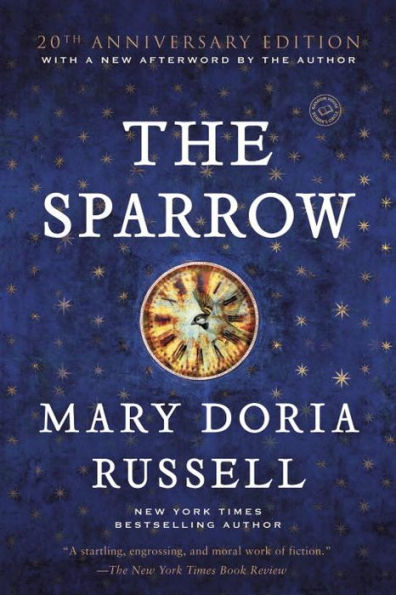

The Sparrow
A Canticle for Leibowitz by Walter M. Miller, Jr.
A Canticle for Leibowitz is about a different aspect of missionary work. Rather than going off into faraway lands and proselytizing (at least at the beginning) Miller’s book is more about the slow work of traveling across an inhospitable landscape to preserve knowledge—more like the Irish monks who travelled across Early Medieval Europe bearing Latin texts and founding isolated churches along the way than their globetrotting spiritual descendants. Canticle is a slow, strange, circular read, revolving around the core image of a group of monks preserving the works of St. Leibowitz for generations after a nuclear war destroy most of human civilization in the mid 1950s. As the Catholic Church rebuilds, human society regroups and squabbles and all-out-wars, unknowingly repeating cycles across centuries, but (without spoiling anything) the book ends on the idea that soon the faith of St. Leibowitz might leave Earth entirely and make its way into the true unknown of space.
Buy the Book
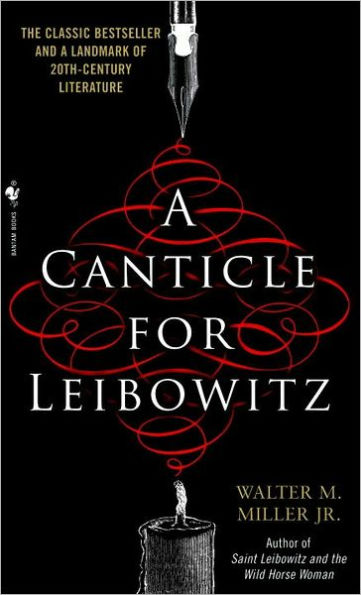

A Canticle for Leibowitz
Sisters of the Vast Black by Lina Rather
…The Reverend Mother looked up to the spot where the crucifix hung. Every shipbound convent and poor colony ministry had the same one, mass-produced on Old Earth and brought by the crateful by newly-ordained priests doing their hardship posts out here in the black. The Reverend Mother hung this one on the wall herself forty years ago, right after the end of the war, when she was a young woman and the ship newly consecrated. They’d both been so young then. After she had affixed the crucifix to the ship’s inner membrane with a dab of bioglue under each of the nails, she had laid her head agains the muculent wall and listened to the heartbeat pumping fluid across the ship’s undulating body.
Most of the Sisters of the Order of Saint Rita acknowledge that there are plenty of gods available in the far reaches of the stars, they simply love their religion the most. But Sisters of the Vast Black also takes place a generation after a terrible war, which was at least partially enabled by the Church’s willingness to deal with an increasingly imperialist Earth government, and the sisters we travel with are a great deal more willing to bend rules for the greater good than their bosses in Rome would appreciate. They’ve been at this a long while, and their Reverend Mother in particular has seen too much of life to follow every rule. (And it takes so long to relay updates through space…who knows what Rome even knows anymore?) They treat their mission not as a proselytic one, but as a chance to hop from colony to space station providing medicine to those who need it, and the occasional baptism or wedding to those who ask for it. At least, until their living ship begins to display a mind of its own, and a new, very straight-laced priest catches up with them, and a distress call comes in that might change their trajectory forever.
Buy the Book
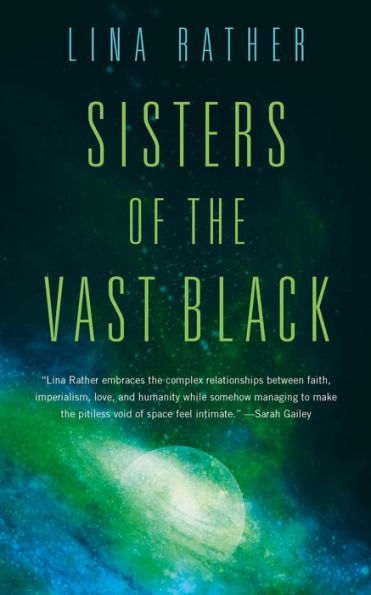

Sisters of the Vast Black
The Book of Strange New Things by Michael Faber
Under the Skin author Michael Faber contributed a strange and complicated book to the space missionary subgenre—one in which the people who could be vulnerable to a potentially oppressive religious system actually want the religion. Peter Leigh is the type of vicar you meet in movies: a former hard-drinking atheist who almost dies in a car wreck before being brought back to life by the love of a good woman – his nurse, Bea. He accepts Bea’s Christianity, and begins to believe it himself. They marry, and he feels that he has a calling to become a vicar. But they aren’t weird about–they live an ordinary life in England and he only preaches to people who want to listen. But this is not the England we know, or the world we know. This is a world that has “The Jump”—a suspended animation system that can help you travel light years away—and a Oasis, a colony that is a home to Earthlings and an indigenous people who absolutely love Christianity. They call the Bible “The Book of Strange New Things” and since their old vicar disappeared they’d really like a new one. Peter, who has been so happy in his life with Bea, feels the old call again, this time pulling him to a new world and an uncertain future. How can he minister to these utterly foreign people? What exactly happened to their old pastor? And why are Bea’s letters filled with the sense that the Earth he left is falling apart?
Buy the Book
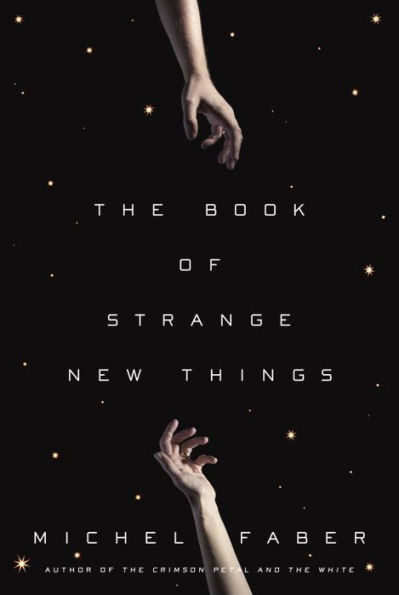

The Book of Strange New Things: A Novel
The Expanse (Series) by James S. A. Corey
The Expanse is about a lot of things, and doesn’t spend too much time on their Mormon characters, but I wanted to include them here because of just how impressive the Nauvoo is, both in the books and in the television adaptation. It’s a truly TITANIC generation ship, designed to carry a pod of Mormons into the stars, and provide them a home for, well, forever, potentially. The thing is though that they have no idea if there are even any aliens, it’s just that if there are the Church of Latter Day Saints wants to find them and minister to them. They have an entire solar system to range across, but in true Mormon spirit they just want to keep going. And after all the impressive engine talk, and their plans to grow sustainable food, the thing that gets me is that the heart of the ship is, essentially, a transplanted mid-century LDS church, complete with cheesy murals of the Church’s founders traveling across the United States. A perfect example of kitsch made beautiful, as these explorers want to take a piece of the past into a blank slate of a future, and remind themselves of the journeys of their ancestors.
Buy the Book
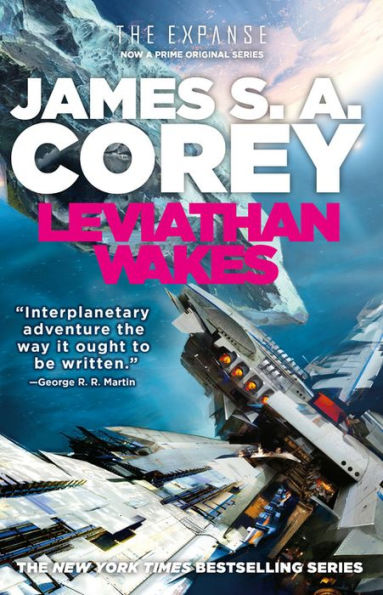

Leviathan Wakes (Expanse Series #1)
The Dazzle of Day by Molly Gloss
Molly Gloss’s work has had a recent upswell of attention thanks to Saga Press’ lovely new editions of her books. The Dazzle of Day, her third novel, is another generation ship saga, although told from a slantwise angle. It opens as people are preparing to embark, and, as most of the spacebound people are Quakers, they consider their ship in the larger history of that religion:
The toroid takes its plain Quaker name, Dusty Miller, from the reflective sail’s whitish aspect in the sun’s transparent light, and I have lain awake and imagined it; the small circle of raft—the houseboat, as people are saying—at the center of its great circle of flimsy sailcloth, moving soundlessly across the blackness of space like .a moth, a leaf, a little puff of pollen adrift on a solar wind, which is an image that sits well with me.
But most of the book concerns what happens when the ship reaches its destination. It glides along in orbit, within easy reach of the planet the original travelers set out to find. But now, where shall they land? Do they want to land at all, or keep moving, looking for new world past this one? Since the ship was originally populated by Quakers, and communal decision-making is the central nervous system of their community, every facet of the mission can now be considered, turned over, and refracted through the opinions of all onboard. Rather than a tale of colonization, or proselytizing gone tragically wrong, or the brutality of religious bureaucracy, Dazzle is a gentle book, in which ethics and the desire for true communication fuels every decision.
Buy the Book
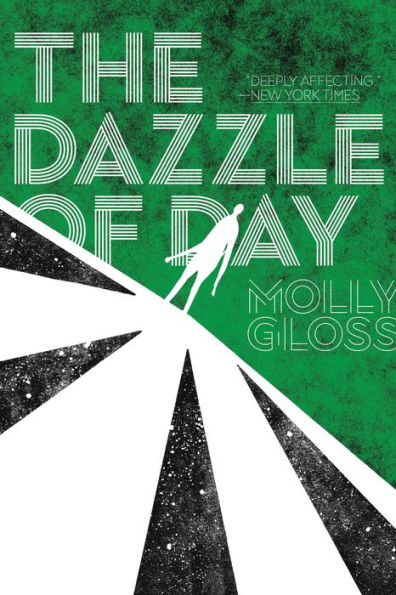

The Dazzle of Day











Dan Simmons’ Hyperion comes to mind here also.
A short story rather than a novel, but Harry Harrison’s The Streets of Ashkelon.
If you’ve not read it, best to find it in one of many, many anthologies and just read it – it’s short, but it drives the point home.
My one-line summary of The Sparrow has always been, “what happens when you attempt First Contact and don’t have something like the Prime Directive in place.” One of my all-time favorite books, with some of my all-time favorite characters.
@2 Yes I was trying to remember the title of that one. Does indeed “drive the point(s) home”…
Here’s a link to an online copy. http://www.lightspeedmagazine.com/fiction/the-streets-of-ashkelon/
#4 Alex Wilcock. Having just read the story, I do recommend it too and commend your comment about it.
A Case of Conscience by James Blish and the Father Carmody stories of Philip Jose Farmer.
A Case of Conscience, James Blish (1958) exactly fits the title. I must try a re-read, and hope to not be disappointed, as often happens with fondly misremembered works:)
It seems to me that some strange interaction between an alien with an odd medical condition and a religion, either theirs or a third party’s, would have made a great topic for a _Sector General_ story, but I don’t recall any that fit.
Maybe this can be a fanfic prompt :)
I’ll always remember how lovingly A Canticle for Leibowitz presents the true Children of God, the vultures.
Also a story rather than a novel, but George RR Martin’s “The Way of Cross and Dragon” is my favorite example of this genre. The narrator (I think I remember it is narrated in the first person) is strictly speaking an inquisitor / enforcer of the “true faith” rather than a missionary, but it’s a fascinating account of the meaning and loss of faith in the context of an interstellar Catholic church.
Dune – Missionaria Protectiva FTW.
I read the Sparrow in a ‘history of Christianity’ class (it made sense in context, lol) and also read its sequel. It is certainly a powerful book.
Being Catholic, I still find it interesting how many of these draw on a kind of Catholic imagery (if not being outright about a literal galactic Catholic church). Although I guess given history and the whole Catholic missionary thing that’s not so surprising, although there definitely are Protestant missionaries now (as well as other faiths). With things like the Amazon Synod causing controversy even today I can’t even fathom what that would even look like and the (even if well-intentioned) chaos that would ensue.
Canticle of Leibowitz is one of those books I always feel like I want to read but am never sure if it will just make me eye twitchy, or feel too personal. (Same with Sisters of the Vast Black, lol).
I don’t think Ruiz-Sanchez in <i>A Case of Conscience</i> is a missionary. He is a member of a commission to decide whether the planet Lithia should be opened to wider contact with Earth. He is fascinated with the theological issues posed by the inhabitants, but I don’t think he ever intended to convert them.
John Scalzi — The God Engines. Relying on a captured god to drive your starships is risky.
The various gods of Max Gladstone’s Craft Sequence.
I would be remiss if I didn’t mention The Order of the Cross and the Dragon by George RR Martin and The Gospel According to Gamaliel Crucis by Michael Bishop.
Two more come to mind:
“Voyage to Alpha Centauri” by Michael O’Brien
“Speaker for the Dead” by Orson Scott Card
Lisamarie @12. Read Canticle for Leibowitz ASAP. It is powerful and delightful.
Neptune’s Brood by Charlie Stross has a whole flying space church with gargoyles and catacombs and priests and whatnot.
So rightly, The Sparrow is named first, because it is a stunningly well crafted and emotionally stirring book. I encourage all to read it.
I will add to this list Mayflies by Kevin O’Donnell which is an interesting tale of the passengers and soul of a generation ship. How civilization breaks down and then is reimagined.
When I think about spacefaring it’s “House of Suns” by Alastair Reynolds that comes to mind
Case of Conscience – the most appalling case of theology taken to its inevitable conclusion
Frankly, I despised the Sparrow and found its sequel even worse. Aside from the huge dollop of antisemitism – which is a little odd given that the author chose to become a Jew – there was such cringing servility towards the Church and the Priesthood that I just couldn’t read more than a chapter at a time.
The Church goes where it wasn’t wanted, and bad things happen to a missionary. There’s a long tradition of that. It’s a well-known hazard of the job. Hell, the Church has done and in some cases continues to do as bad and worse to its own members, especially women and children. But no, the fact that it happened to a Priest shakes the Holy See to its core. Toss in a gratuitous gynocide and the destruction of an entire planet’s culture. I just can’t see why people are so enthralled with this series.
Arthur C. Clarke wrote a short story titled The Star I believe about a Catholic priest who was part of a crew of a rocket ship which visited the star which went nova but a had a planet which had contained an intelligent race.
@2, @@.-@, @5–
I am impressed. That’s a damned good story. Thank you all for bringing it to my notice.
Poul Anderson’s “The High Crusade”. Medieval monks accidentally conquer the Universe!
@25: the conquering is done by a would-be crusader and his descendants. The monk is just along to tell him it’s all OK; AFAICT (from a very compressed epilog) that’s about the role of his ~millennium of descendants. Not really a missionary story.
I just came here to make sure the Sparrow and the Book of Strange New Things were mentioned and I leave satisfied.
@@@@@ 22, I read the Sparrow long before a lot of abuse by the modern day church came to light. In the logic of the story, I, an atheist, totally believed what the protagonist believed, and was shattered along with him as the story went on.